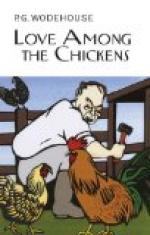And at the first of these bridges I met Phyllis.
I came upon her quite suddenly. The other end of the bridge was hidden from my view. I could hear somebody coming through the grass, but not till I was on the bridge did I see who it was. We reached the bridge simultaneously. She was alone. She carried a sketching-block. All nice girls sketch a little.
There was room for one alone on the footbridge, and I drew back to let her pass.
It being the privilege of woman to make the first sign of recognition, I said nothing. I merely lifted my hat in a non-committing fashion.
“Are you going to cut me, I wonder?” I said to myself. She answered the unspoken question as I hoped it would be answered.
“Mr. Garnet,” she said, stopping at the end of the bridge. A pause.
“I couldn’t tell you so before, but I am so sorry this has happened.”
“Oh, thanks awfully,” I said, realising as I said it the miserable inadequacy of the English language. At a crisis when I would have given a month’s income to have said something neat, epigrammatic, suggestive, yet withal courteous and respectful, I could only find a hackneyed, unenthusiastic phrase which I should have used in accepting an invitation from a bore to lunch with him at his club.
“Of course you understand my friends—must be my father’s friends.”
“Yes,” I said gloomily, “I suppose so.”
“So you must not think me rude if I—I——”
“Cut me,” said I, with masculine coarseness.
“Don’t seem to see you,” said she, with feminine delicacy, “when I am with my father. You will understand?”
“I shall understand.”
“You see,”—she smiled—“you are under arrest, as Tom says.”
Tom!
“I see,” I said.
“Good-bye.”
“Good-bye.”
I watched her out of sight, and went on to interview Mr. Leigh.
We had a long and intensely uninteresting conversation about the maladies to which chickens are subject. He was verbose and reminiscent. He took me over his farm, pointing out as we went Dorkings with pasts, and Cochin Chinas which he had cured of diseases generally fatal on, as far as I could gather, Christian Science principles.
I left at last with instructions to paint the throats of the stricken birds with turpentine—a task imagination boggled at, and one which I proposed to leave exclusively to Ukridge and the Hired Retainer—and also a slight headache. A visit to the Cob would, I thought, do me good. I had missed my bathe that morning, and was in need of a breath of sea-air.
It was high-tide, and there was deep water on three sides of the Cob.
In a small boat in the offing Professor Derrick appeared, fishing. I had seen him engaged in this pursuit once or twice before. His only companion was a gigantic boatman, by name Harry Hawk, possibly a descendant of the gentleman of that name who went to Widdicombe Fair with Bill Brewer and old Uncle Tom Cobley and all on a certain memorable occasion, and assisted at the fatal accident to Tom Pearse’s grey mare.




